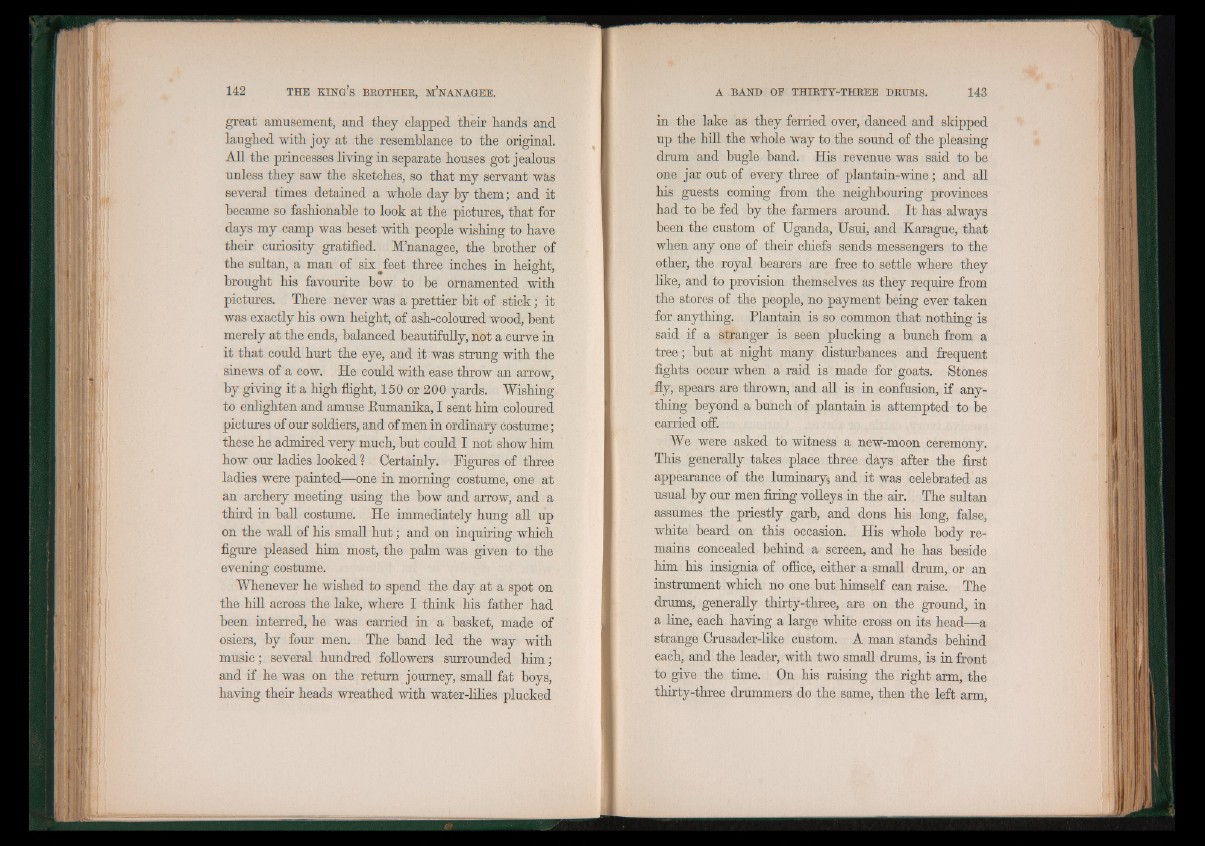
great amusement, and they clapped their hands and
laughed with joy at the resemblance to the original.
All the princesses living in separate houses got jealous
unless they saw the sketches, so that my servant was
several times detained a whole day by them; and it
became so fashionable to look at the pictures, that for
days my camp was beset with people wishing to have
their curiosity gratified. M’nanagee, the brother of
the sultan, a man of six feet three inches in height,
brought his favourite bow to be ornamented with
pictures. There never was a prettier bit of stick; it
was exactly his own height, of ash-coloured wood, bent
merely at the ends, balanced beautifully, not a curve in
it that could hurt the eye, and it was strung with the
sinews of a cow. He could with ease throw an arrow,
by giving it a high flight, 150 or 200 yards. Wishing
to enlighten and amuse Kumanika, I sent him coloured
pictures of our soldiers, and of men in ordinary costume;
these he admired very much, but could I not show him
how our ladies looked ? Certainly. Figures of three
ladies were painted—one in morning costume, one at
an archery meeting using the bow and arrow, and a
third in ball costume. He immediately hung all up
on the wall of his small h u t; and on inquiring which
figure pleased him most, the palm was given to the
evening costume.
Whenever he wished to spend the day at a spot on
the hill across the lake, where I think his father had
been interred, he was carried in a basket, made of
osiers, by four men. The band led the way with
music; several hundred followers surrounded him;
and if he was on the return journey, small fat boys,
having their heads wreathed with water-lilies plucked
in the lake as they ferried over, danced and skipped
up the hill the whole way to the sound of the pleasing
drum and bugle band. His revenue was said to be
one jar out of every three of plantain-wine; and all
his guests coming from the neighbouring provinces
had to be fed by the farmers around. It has always
been the custom of Uganda, Usui, and Karague, that
when any one of their chiefs sends messengers to the
other, the royal bearers are free to settle where they
like, and to provision themselves as they require from
the stores of the people, no payment being ever taken
for anything. Plantain is so common that nothing is
said if a stranger is seen plucking a bunch from a
tree; but at night many disturbances and frequent
fights occur when a raid is made for goats. Stones
fly, spears are thrown, and all is in confusion, if anything
beyond a bunch of plantain is attempted to be
carried off.
We were asked to witness a new-moon ceremony.
This generally takes place three days after the first
appearance of the luminary^ and it was celebrated as
usual by our men firing volleys in the air. The sultan
assumes the priestly garb, and dons his long, false,
white beard on this occasion. His whole body remains
concealed behind a screen, and he has beside
him his insignia of office, either a small drum, or an
instrument which no one but himself can raise. The
drums, generally thirty-three, are on the ground, in
a line, each having a large white cross on its head—a
strange Crusader-like custom. A man stands behind
each, and the leader, with two small drums, is in front
to give the time. On his raising the right arm, the
thirty-three drummers do the same, then the left arm,